North Carolina Wesleyan (NCWU) proudly welcomed Richard Davenport, President & Project Manager, and Doug Broughton, Vice President of Operations and Development, of Calvin Davenport, Inc. back to campus this week to express gratitude for their outstanding work in the recent renovation to the University’s Nursing Building.

The visit celebrated not only the successful completion of a complex project but also recognized a long-standing relationship between the Davenport Family and Wesleyan. Richard Davenport’s family has been dedicated supporters of the University for many years, with a scholarship named in honor of his grandparents, Taswell and Fidelia Griffin Endowed Scholarship Fund, continuing to support Wesleyan students.
Throughout the renovation process, the Calvin Davenport, Inc. team collaborated closely with Suzanne Brackett ’87, Senior Vice President of Administration, delivering the project ahead of schedule with unmatched quality and professionalism. One of the most unique challenges faced during the renovation was the removal of the massive vault from the building’s former life as a bank. When asked about this task, Doug Broughton shared, “Removing the vault within 90 days was definitely one of the most unique and rewarding parts of the entire renovation.”
To commemorate this impactful partnership, a plaque has been installed in the building’s lobby, permanently recognizing Calvin Davenport, Inc. for their dedication and craftsmanship in transforming the space into a state-of-the-art facility for nursing education.

“We are deeply grateful for the diligence, care, and partnership with Richard, Doug, and the entire Calvin Davenport, Inc. team brought to this project,” said Suzanne Brackett. “Their work not only created a state-of-the-art learning environment but also honors the Wesleyan tradition of investing in our students’ futures.”
Wesleyan Signs with SIFEC
North Carolina Wesleyan University (NCWU) has announced a new partnership with Shanghai Textile Industry Workers’ College (SIFEC), further expanding its global educational reach. The agreement was officially signed on Monday, March 10, during a virtual ceremony attended by key leaders from both institutions.

Participants in the signing and partnership included NCWU President Dr. Evan D. Duff, Provost Dr. Joseph Lane, Associate Provost Dr. Molly Wyatt, Vice President of Enrollment Dr. Oscar Rodrigues, Chief Engagement Officer Cindy Edwards, and NCWU Trustee Jerome Ma. Representing SIFEC were President Xie Decheng, Contract Manager Jennifer Yang, Dean of International Education Sophia Liu, and VIP Investor for International Education Yan Yeti.
The 1+3 programs that we have signed with SIFEC (Shanghai International Fashion Education Center) and are exploring with other partners is a unique program in which students will complete one year of prerequisite and English courses at the Chinese institution before coming to the U.S. for three years to complete a B.S. in select fields (including Management and Marketing) at North Carolina Wesleyan University. These partnerships will allow students from our partner institutions to learn about U.S. business fields here in Rocky Mount while completing their NCWU degree and preparing for more industry-specific studies in China. We look forward to working with these students to provide an excellent international education experience.
The students will not be receiving online instruction. They will actually spend three years in residence on our Rocky Mount campus. However, online meeting technologies does allow students who are entering the program to meet with their future U.S. advisors to plan their educational experience as they complete their first year of prerequisite courses in China.
“We are excited to welcome these students and provide them with a seamless transfer pathway to complete their dual degrees,” said NCWU President Dr. Evan D. Duff. “This partnership reflects our commitment to expanding global education opportunities and fostering international collaboration.”
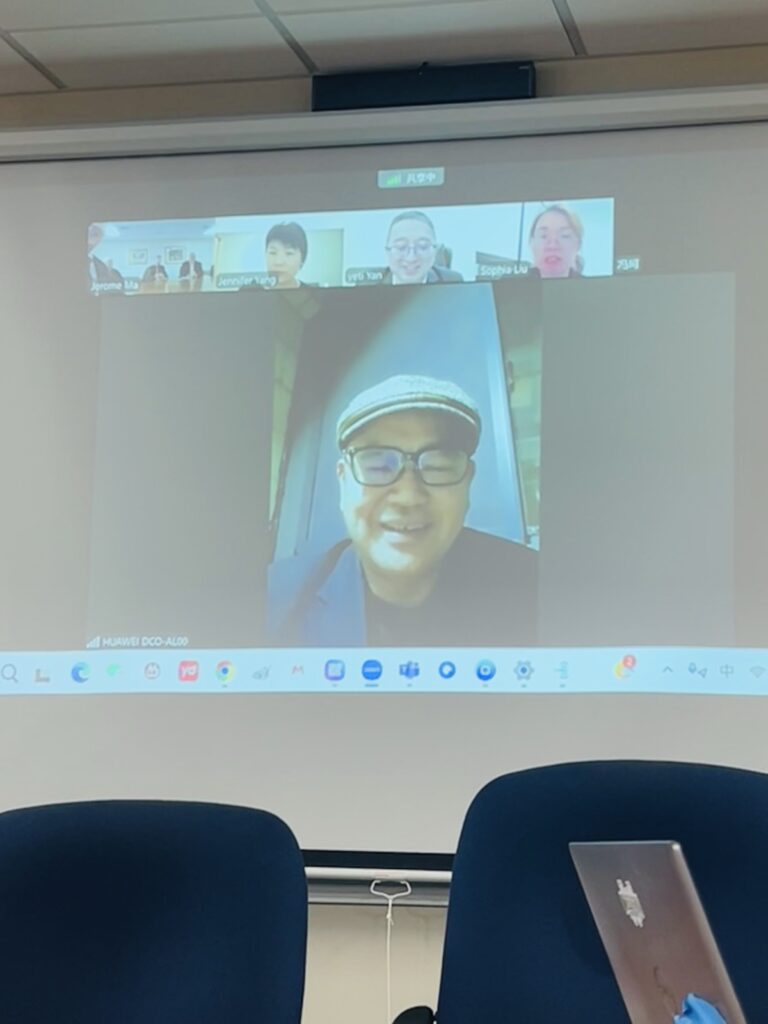
In a continued effort to strengthen ties with SIFEC, Dr. Duff will be visiting China June 22 – 27, 2025, where he will meet face-to-face with collaborators, explore new opportunities for academic cooperation, and further solidify NCWU’s presence in the international education landscape.
The agreement marks another step in NCWU’s dedication to providing accessible, high-quality education while strengthening its international partnerships.
NCWU Launches New Academic Podcast: The Deep End
North Carolina Wesleyan University (NCWU) is proud to announce the launch of its newest academic initiative: The Deep End Podcast, a platform that brings the innovative research, scholarship, and passion of NCWU faculty straight to listeners’ ears.
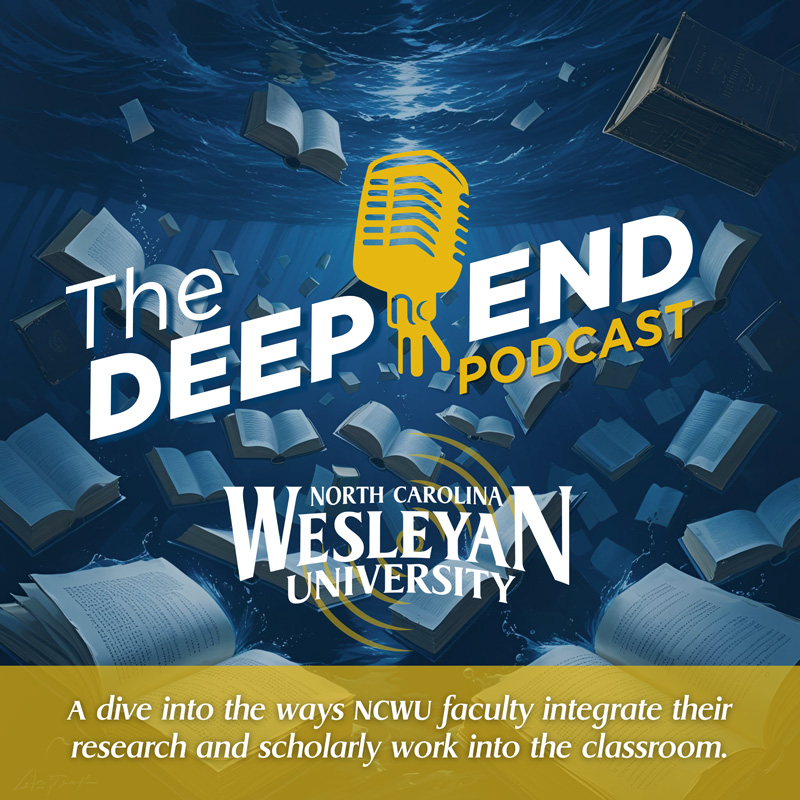
Spearheaded by Dr. Joseph Lane, Provost and Senior Vice President for Academic Affairs, The Deep End dives into the creative ways faculty integrate their scholarly work into the classroom experience. Each episode highlights NCWU’s teacher-scholars and offers valuable insights for students, alumni, and fellow educators alike.
“Our goal is to share the intellectual energy happening every day on campus,” said Dr. Lane. “This podcast allows us to celebrate the brilliant work of our faculty and how they make learning relevant and exciting for our students.”
The first three episodes, now available on Spotify, Apple Podcasts, and YouTube, feature engaging conversations with:
- Dr. Shane Thompson, discussing ancient cultures and languages
- Drs. Meredith Gringle and Ami Thompson, on public health and biology
- Dr. Doreen Thierauf, exploring English literature in new ways
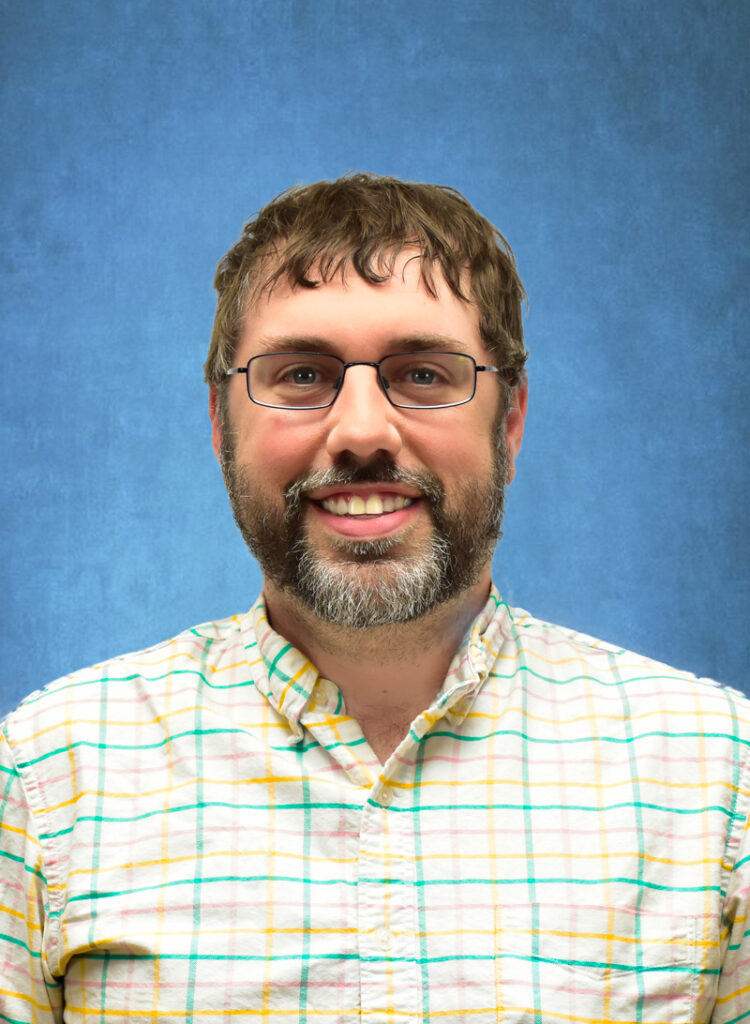
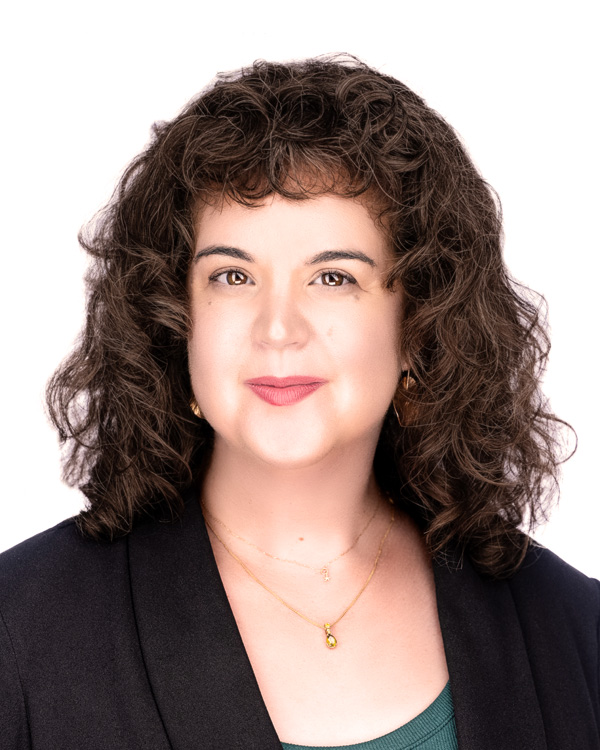


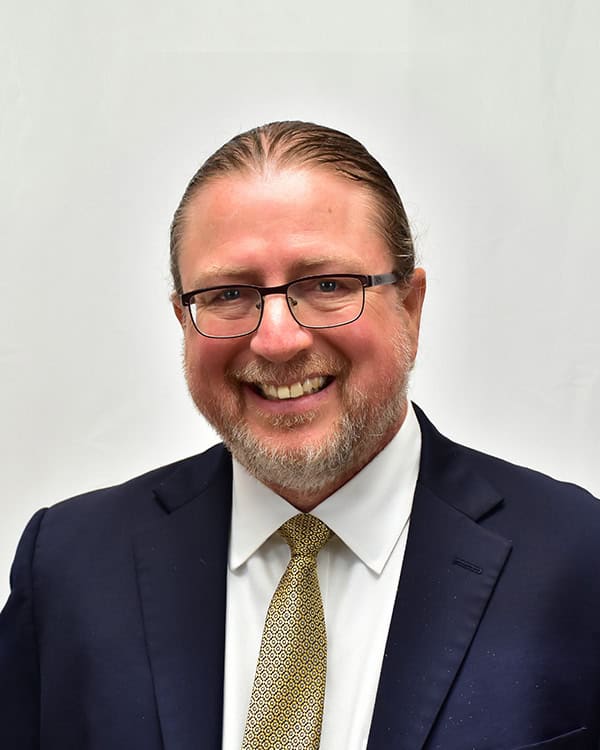

New episodes will be released throughout the year, with upcoming guests including Dr. Benjamin Hiskes (Psychology), Tyana Ellis (Communication), Dr. Daniel Elias (Environmental Science), and Dr. Emily Weber (Biology/Pre-Medical Sciences advisor).
Dr. Shane Thompson (Religious Studies and Director of the Office of Undergraduate Research) manages the recording schedules and will host some episodes.
The podcast is produced by an undergraduate student, Shafiq Nuijts, NCWU Class of 2026. Shafiq contributes to recording and editing each episode. His leading role in bringing the Deep End to life demonstrates North Carolina Wesleyan’s commitment to offering a Personal, Practical, and Purpose-Driven Education, by giving students hands-on experiences in a variety of fields, including digital content creation.
Listeners can stream The Deep End Podcast on Spotify, Apple Podcasts, and YouTube.
NCWU Prepares for Record-Breaking Summer of Camps
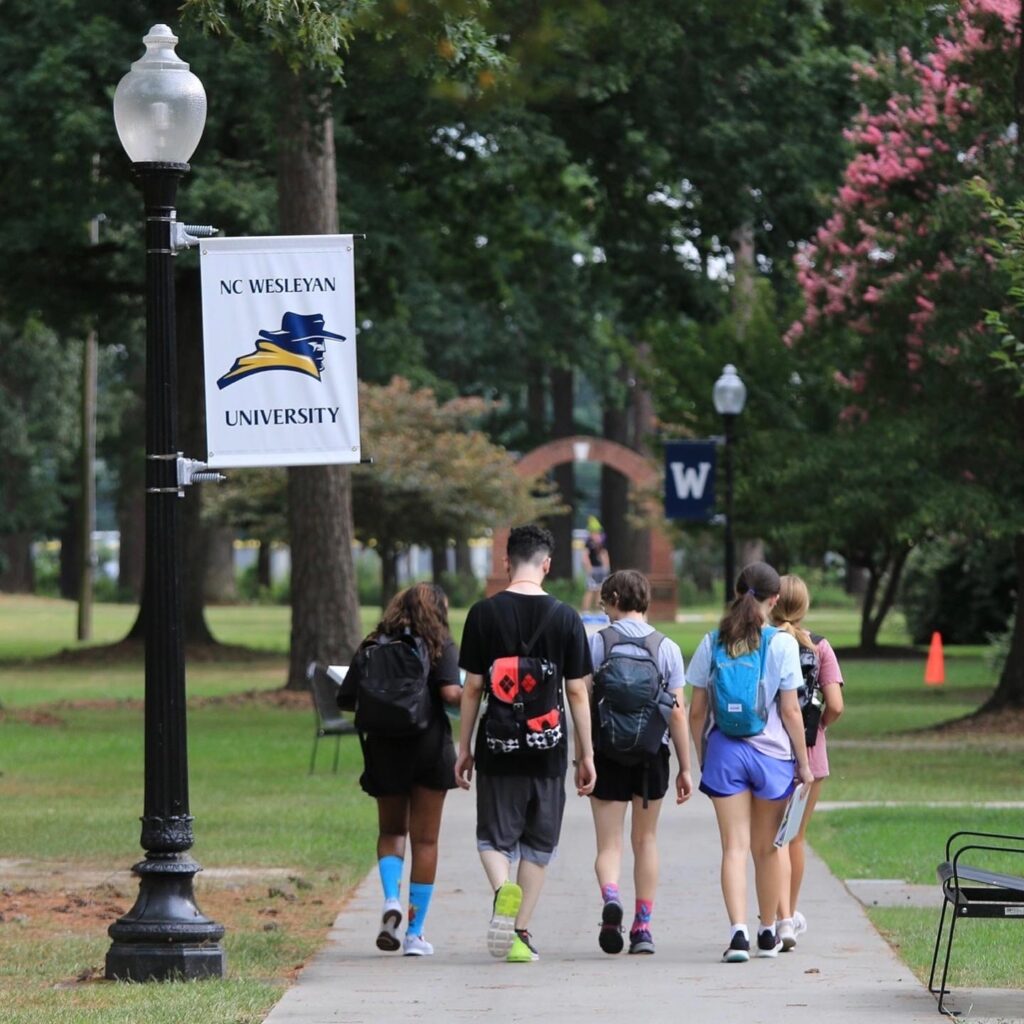
For more than four decades, North Carolin Wesleyan University (NCWU) has welcomed thousands of campers each summer, fostering a tradition rooted in learning, leadership, and community connection. What began as a commitment to youth enrichment has grown into one of the most dynamic summer programs in the region. In Summer 2025, that tradition continues – bigger than ever – with a record-breaking 2,993 campers scheduled to visit Wesleyan’s campus over the course of just ten weeks.
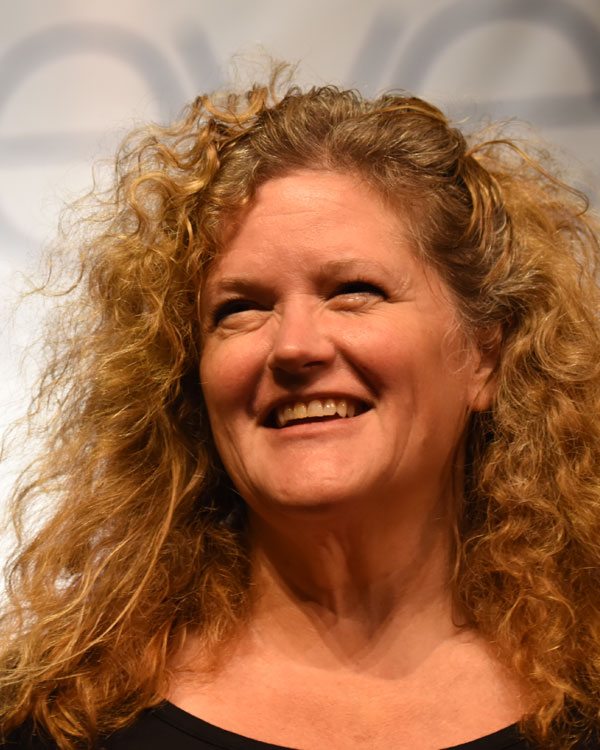
“This year marks the largest summer camp attendance in the history of Wesleyan Camps,” says Kimla Brandt, NCWU Event Logistics Coordinator and Summer Camp Director. “It’s a testament to the trust our community and partners place in us, and to our long-standing dedication to creating impactful, welcoming experiences for youth and organizations alike.”
The 2025 camp season kicked off early with two educational programs from UNC Chapel Hill. The Morehead Cain Foundation brought 88 students to campus for their Civic Collaboration Training Camp in partnership with the City of Rocky Mount and the Rocky Mount Event Center. The event featured a keynote from the mayor and was honored with a citywide proclamation of “Morehead Cain Day”. Simultaneously, NCWU, in collaboration with Dr. Robert Simpson, hosted UNC’s Frank Porter Graham Child Development Institute for a training program as part of their Rural Church Summer Literacy Program – further highlighting Wesleyan’s commitment to equitable access and academic outreach.
The university’s schedule is packed from the start. From June 7-8, the Fellowship of Christian Athletes (FCA) returns with its largest football camp to date, bringing 1705 athletes, coaches, and staff from across North Carolina. Next, the United Pentecostal Youth Camp brings 324 campers, followed by the first-ever FCA Women’s Camp at Wesleyan, welcoming 200 participants from June 29 – July 3 after losing their longtime venue due to Hurricane Helene.
Running concurrently from June 30 – July 5, The Tennessee Mission Group will return for their annual community service work in Rocky Mount, supporting senior citizens and participating in local building projects. In addition, Pfizer will return for a three-week training series in the Shaw Classroom Building.
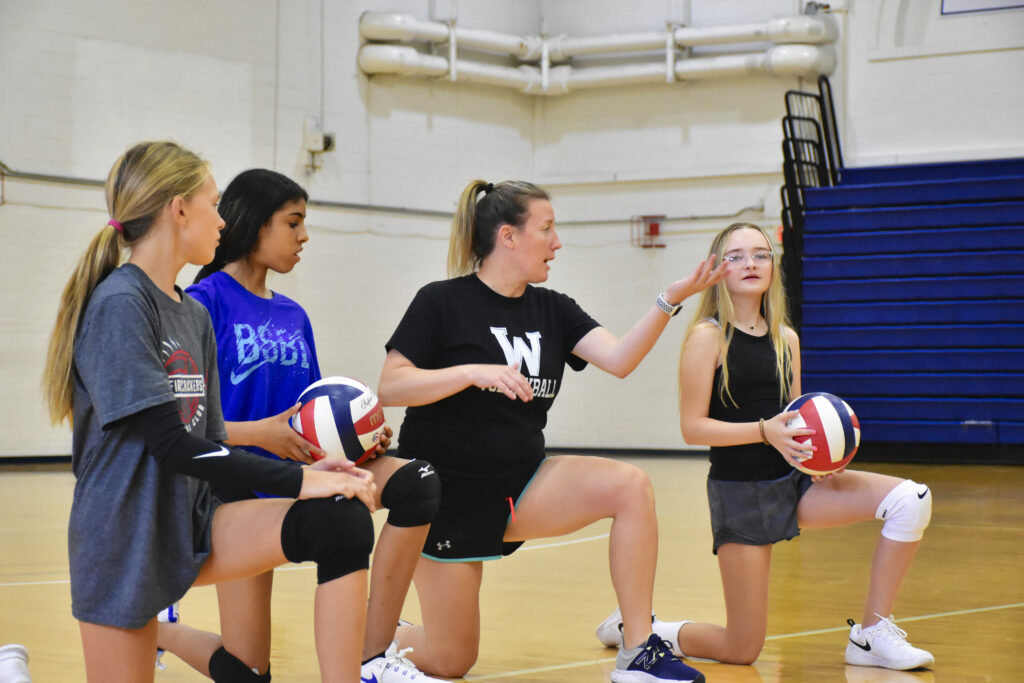
July will see the return of the Shelton Leadership Camp, along with a variety of NCWU-hosted athletic and academic camps, including: NCWU Soccer Strength and Agility Camp, Matthewson Summer Law Camp, and NCWU Football Camp. The month will close with the NCWU Volleyball Camp, and the Athens Drive Band Camp from July 26 – August 1, marking their first time marching on Wesleyan’s turf field and their large attendance since the COVID-19 pandemic.
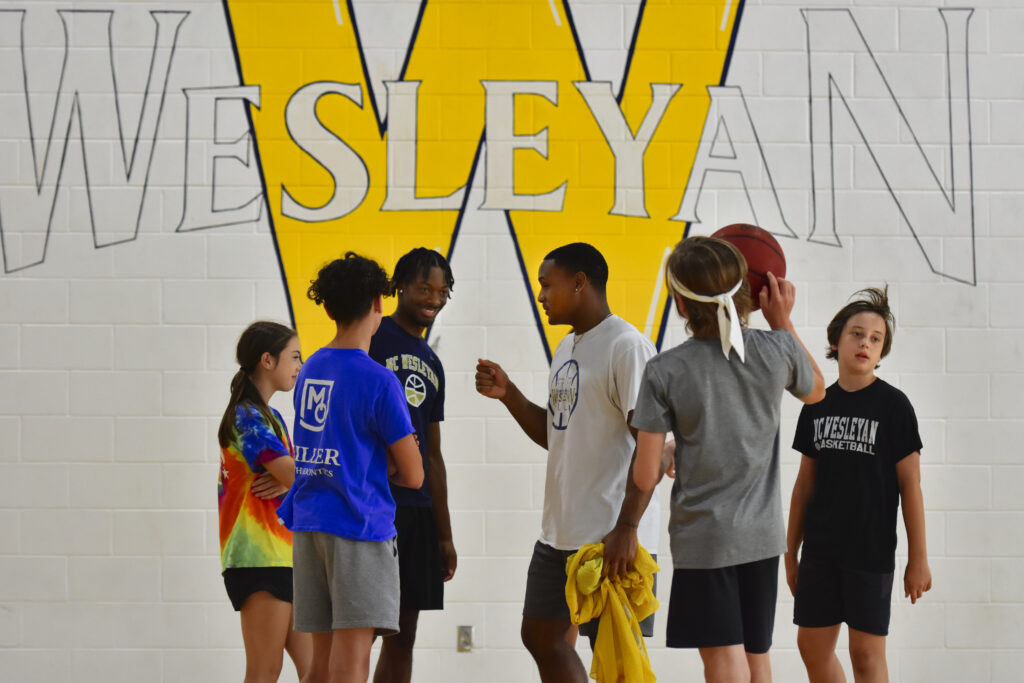
“New beginnings are on the horizon,” said Brandt. “Each camp brings a new opportunity to make a difference, build memories, and further strengthen the bond between Wesleyan and our broader community.”
From Court to Career: Nadia Simmons’ Path in Sports Administration

Nadia Simmons, a standout student in Business and Sports Administration at North Carolina Wesleyan University (NCWU), continues to pave the way toward a promising career in athletics and sports leadership. A dual graduate of North Carolina Wesleyan University—earning her undergraduate degree in 2024 and her Master of Business in 2025—Simmons exemplifies the impact of hands-on experience, academic commitment, and personal initiative.
From 2021 to 2023, Simmons interned as a Youth Sports Coordinator at the Henderson Family YMCA through support from the Golden LEAF Foundation. During her internship, she led engaging youth sports programs, promoted teamwork and fitness, supported coaches, and built strong relationships with families in the community.
“Witnessing the development of the youth and building bonds with families was incredibly rewarding,” said Simmons. “It strengthened my leadership skills and deepened my passion for community involvement and youth athletics.”

Currently serving as a Graduate Intern in NCWU’s athletic department, Simmons remains focused on preparing for a future career in athletics. She continues to actively explore professional opportunities and credits her proactive networking and the foundational support of the Golden LEAF Foundation with helping position her for success.

“My time at NCWU has been truly exceptional,” Simmons said. “The diverse and welcoming environment here has expanded my skill set and connected me with inspiring individuals across campus. The relationships I’ve built have created a vibrant and supportive academic community.”
A five-year member of the NC Wesleyan Women’s Basketball Team, Simmons chose the university for its unique blend of academic excellence and athletic competitiveness. “I was drawn to NCWU’s family atmosphere and strong athletics program. Being able to pursue my degree while playing the sport I love made my college experience meaningful,” she added.
Simmons also shares a personal connection to Wesleyan through her family – she is the proud older sister of twin sisters who are set to graduate from NCWU next year.

As she looks ahead to her graduation in 2025, Simmons remains a powerful example of how passion, purpose, and perseverance can create lasting impact both on and off the court.
NCWU Graduate to Ph.D. at Texas A&M University

Andy Rizzo, a standout graduate of North Carolina Wesleyan University’s Class of 2025, has dual-earned Bachelor of Science degrees in Biology and Environmental Science. Hailing from Buenos Aires, Argentina, Andy chose NCWU for its small, welcoming campus and strong support for international students.
“I felt it would make my transition as an international student easier,” Andy said. “But what made me stay was the community – the friends, faculty, and staff who made my college journey truly amazing.”
Andy’s time at Wesleyan was marked by involvement and leadership. She served as RA and Head RA, led both the Student Entertainment & Activities Team (S.E.A.T.) and the International Bishop Association, and was active in multiple honor societies and student organizations. Her dedication was recognized with several awards, including the Algernon Sydney Sullivan Award, Environmental Science Award, Internship Award for her work at Pfizer, and being crowned Homecoming Princess in 2023 and Homecoming Queen in 2024.
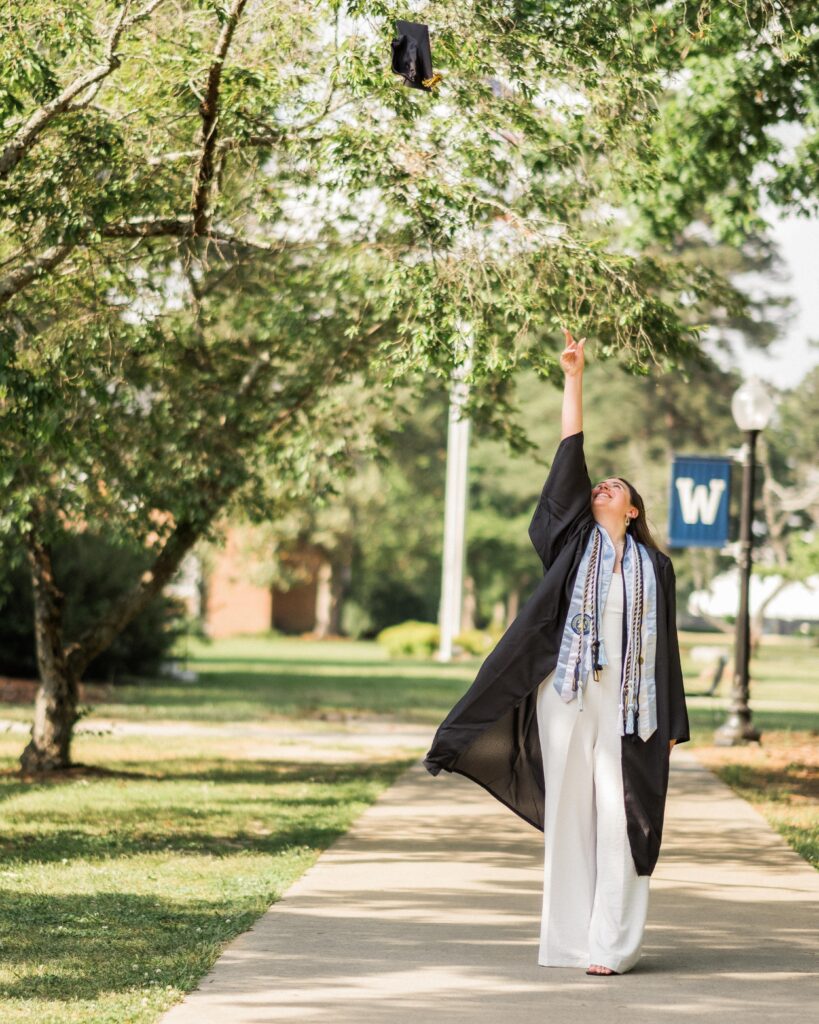
One of her biggest academic influences was Dr. Daniel Elias, under whom Andy conducted research on environmental pollutants. Dr. Elias reflected, “Watching Andy grow as a researcher has been one of the most rewarding parts of my work. Through her leadership on projects studying PFAS, salinity, microplastics, and predatory cues in Physa acuta, her presentations at multiple conferences, and her mentorship through the NSF GeoPath program, Andy showed true academic growth, resilience, and responsibility. Beyond the lab, she also helped lead outreach efforts, native planting projects, and citizen science initiatives. I could not be prouder of her journey and everything still ahead.”
Now, Andy is heading to Texas A&M University-Corpus Christi to pursue her Ph.D. in Marine Biology, backed by a teaching assistantship with Dr. Seemann. She’ll be researching the effects of environmental pollutants on fish – continuing the meaningful work she started at Wesleyan.
“I’m very grateful for my journey at Wesleyan,” she said. “None of my accomplishments would have been possible without the support of my parents, my friends from home and at Wesleyan, Mrs. Dawn Turner, and Dr. Daniel Elias.”
Employees Turn Tuition Perk into Diplomas
Director of Campus Safety, Controller, Sports Information Director, and Accounts Payable Specialist give the inside scoop on graduating with a discount.

At North Carolina Wesleyan University (NCWU), employees aren’t just shaping student success—they’re living it. Through the University’s generous tuition discount program, eligible employees, their spouses, and their dependent children can pursue undergraduate degrees tuition-free. This 100% tuition discount opens doors for families to grow academically together, while also inspiring a culture of lifelong learning across campus. For those looking to advance even further, discounts are also available for graduate coursework, making it easier than ever for staff and faculty to sharpen their skills, earn advanced credentials, or pivot into new fields. At NC Wesleyan, education is not just a benefit—it’s a shared journey.
We interviewed just a few who have taken advantage of this benefit and the results are telling.
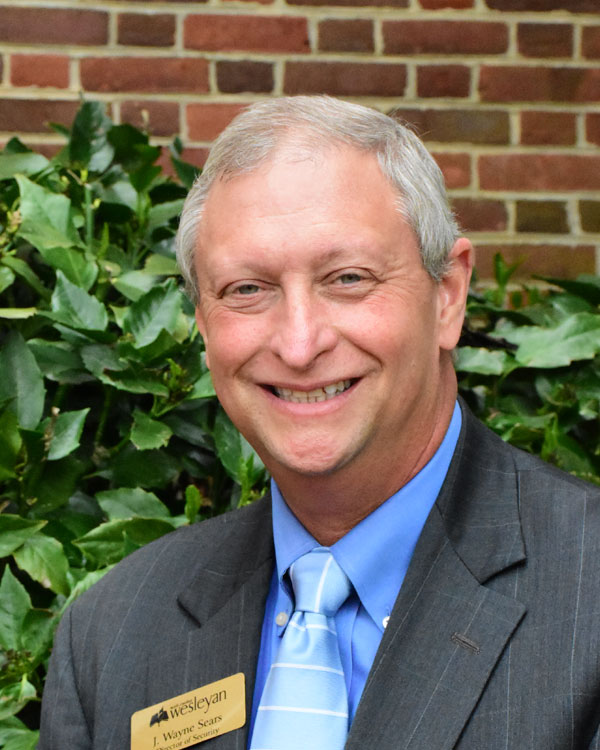
Meet Wayne Sears, Director of Campus Safety. Mr. Sears has worked at Wesleyan for nine years and in May 2023 received a Master of Science in Criminal Justice, due to his desire of “wanting the option to teach in the field of Criminal Justice and wanting to understand what the educational environment is like for our NCWU student family”.
What advice do you have for people considering Wesleyan graduate school while working?
Don’t put off post-graduate work. A Master’s Degree now separates educational accomplishment and knowledge in the workforce. Wesleyan’s Criminal Justice Program is a structured progressive program from beginning to end.
How would you describe your relationships with your professors?
Great! I could text, email, or call them often on their cell phones. Which I did, and they always responded. I am friends with several of them to this day.
Was there a moment you felt especially proud of your accomplishment?
Having been in the Criminal Justice field since I was twenty years old gave me a complex that I had to do exceptionally well. That was a personal challenge to me. I was awarded the Outstanding MSCJ Student award backed with a perfect 4.0 GPA and that was extremely satisfying!
Describe your graduate school journey in 3 words.
Well. Worth It.
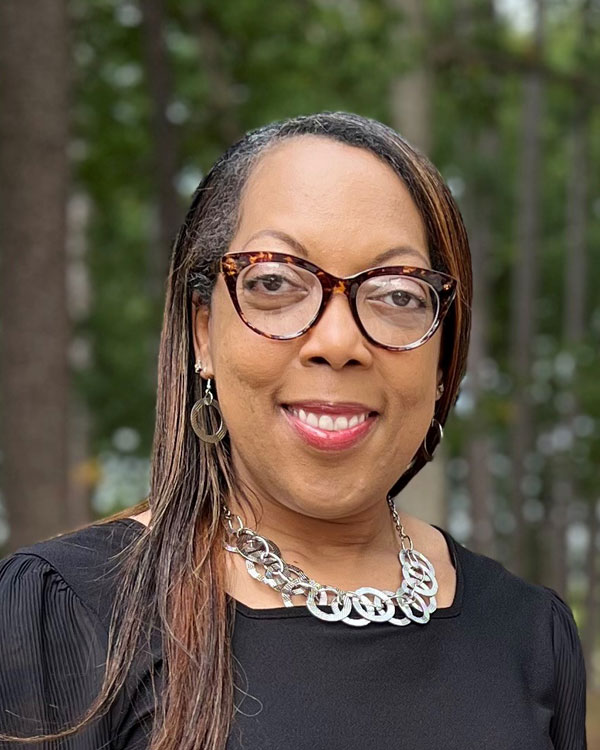
Teikisha Anderson, Controller and employee of over eleven years, is currently obtaining a Master of Strategic Leadership Degree and plans to graduate in May 2025. Her motivation was enhanced once receiving a promotion into a leadership position on campus and feels that this degree will equip her with the essential skills necessary to become an innovative and effective leader.
What advice do you have for people considering Wesleyan graduate school while working?
Do it! The Graduate Programs are designed and structured to meet the needs of the average working adult. With effective time management and dedication, they can successfully balance home, work, and academic responsibilities. While some temporary sacrifices may be necessary, the overall achievements and benefits will be worth it.
How would you describe your relationships with your professors?
Working at NC Wesleyan has allowed me to connect with some of my professors on a professional level. However, as a staff member, I do not receive any preferential treatment regarding my classes or expectations. While I am familiar with some professors, many of them are adjuncts whom I have never met personally. Regardless, my experiences with my professors have been overwhelmingly positive. They communicate effectively and respond to my questions and concerns. Even in taking all online classes, the smaller class sizes allow professors to address any issues, confusion, or concerns promptly, which I can truly appreciate.
Was there a moment you felt especially proud of your accomplishment?
My proudest moment will be walking across that stage wearing that hooded regalia but that has yet to come; however, for now, I am proud of myself for pushing forward every day and maintaining a 4.0 GPA. As a self-proclaimed perfectionist, I am slightly obsessed with and committed to doing my absolute best in all that I do. I am committed to this academic journey and that in itself is my proudest accomplishment.
Describe your graduate school journey in 3 words.
God’s Got Me!

Entering his sixth year at Wesleyan, Bayden Collins is Wesleyan’s Sports Information Director. He received his Master of Business Administration Degree in December 2024. Collins was self-motivated to obtain a Master’s Degree from a very early age and feels that it will greatly help him in his career of administration in collegiate athletics.
What advice do you have for people considering Wesleyan graduate school while working?
I would highly recommend the Graduate Program while working at NCWU because there is no better place that you can obtain a degree in one year online while working at the same time. I am extremely blessed to say I earned my MBA at the age of 22 and Wesleyan afforded me that opportunity.
How would you describe your relationships with your professors?
While I was online, I still felt a very close relationship with my professors. Whenever I needed something, I could call or email them at any time if I ever needed anything. Also, each professor would do a beginning-of-the-week video/lecture where you felt like you were in the classroom which led to an awesome learning experience!
Was there a moment you felt especially proud of your accomplishment?
I was especially proud at the hooding ceremony when I saw Coach Denton, Mr. Mike Armbruster, and Coach Thompson outside the Dunn Center waiting to congratulate me. It meant a lot, and I am glad to work with such great people!
Describe your graduate school journey in 3 words.
Rewarding, Challenging, Enlightening
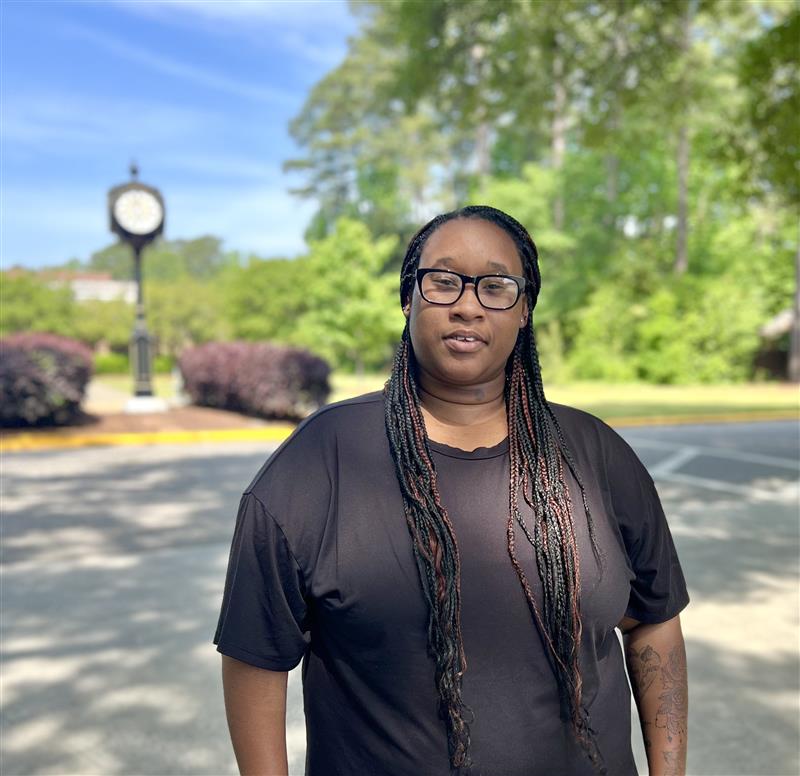
DeOnna Wilson worked at Wesleyan in the Business Office for four years before she accepted her current role as an Accounts Payable Specialist. She completed her Master of Business Administration in 2023 with the support of her family and “work family”. Wilson learned that it was essential to never be afraid of asking questions, as “seeking help can lead to growth and understanding”.
What advice do you have for people considering Wesleyan graduate school while working?
For those pursuing Graduate School while working, mastering time management and establishing a realistic schedule is essential. Prioritize your tasks and confidently seek clarification from professors whenever necessary—they are there to support you. Don’t forget to include breaks in your schedule; maintaining a healthy balance between work and study is crucial for your success.
How would you describe your relationships with your professors?
I had varied relationships with my professors during my studies. With the professors I connected with, I fI had varied relationships with my professors during my studies. I found myself emailing some professors almost every other day to clarify assignments or projects. They were incredibly supportive and always willing to go the extra mile to assist me. Whenever they were on campus, they would take the time to meet with me, walking me through my mistakes and helping me understand the material better. I appreciated their pride in my efforts to learn, and their quick responses to my emails made it even easier to seek help. It truly made a difference in my learning experience.
Was there a moment you felt especially proud of your accomplishment?
The moment I felt a wave of pride for my accomplishment was when I walked across that stage to receive my diploma. Seeing all my family and work family there, beaming with smiles as I crossed that stage, made the achievement even more special. I completed my Master’s Degree despite the doubts I faced at the beginning and the many nights filled with tears questioning whether I could pull it off. In the end, it was all worth it, as I not only passed all my classes but also got to celebrate this significant milestone with my loved ones.
Describe your graduate school journey in 3 words.
Determined. Nervous. Time Management.
NC Wesleyan University Sends Off Class of 2025
On Saturday, May 2025, North Carolina Wesleyan University held its annual commencement ceremony at the Rocky Mount Event Center. The University celebrated over 360 graduates, marking its 85th graduation.

The event was open to graduates, faculty, the platform party and guests of graduates where over 2000 were in attendance. University Chaplain, Rev. Edwin Ferguson, gave the invocation, followed by a performance of the Star-Spangled Banner by alumna, Ms. Latisha Scott ’06.
President Dr. Evan D. Duff welcomed the crowd to the momentous occasion and congratulated the graduates on their accomplishments noting, “Your degree is provided by an institution which seeks not only to dispense knowledge and develop the habits for lifelong learning, but also expects its graduates to be responsible citizens, contributors to the common good and individuals who care about others. As we celebrate together, we acknowledge the obligations all of us have to help bring about a better world.”
Commencement Keynote Speaker
The commencement address was given by Mr. Danijel Velicki, Entrepreneur, Financial Educator, and Founder of Opus Wealth Strategies and Sqwire, LLC. Originally from Zagreb, Croatia, Velicki immigrated to the United States in 1995 with just $40 to his name. He worked tirelessly to fund his education, earning a bachelor’s degree in marketing and finance from Fairmont State University. Today, Velicki is a thriving business owner and is pursuing a graduate degree in Innovation and Strategy at Oxford University’s Saïd Business School.
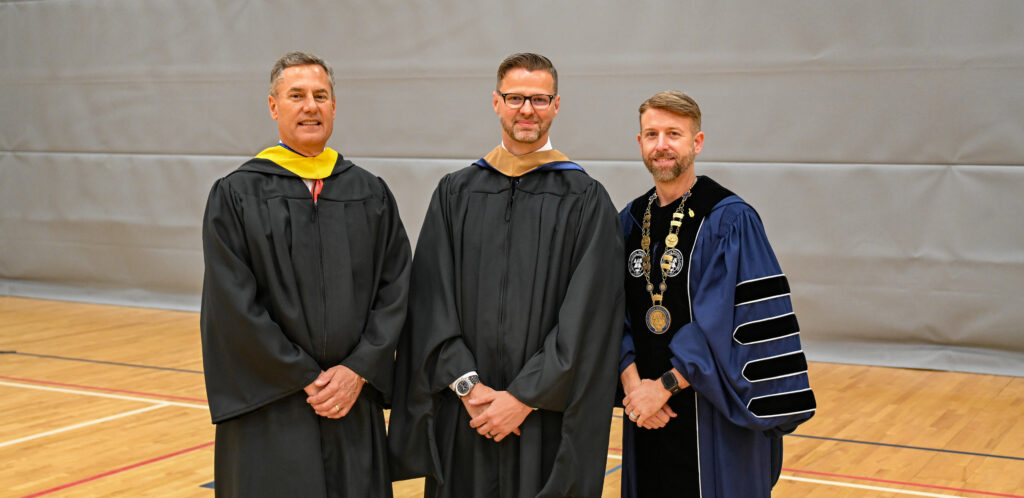
Through his financial education platform, Sqwire, Velicki aims to empower individuals and families with the tools they need to achieve financial stability and success. The platform offers online lessons and personalized support to help users develop smart spending habits and make informed financial decisions for to support a prosperous life. Velicki’s philosophy is deeply rooted in his belief that the “American Dream” is attainable for everyone with the right support and determination.
Velicki addressed the graduates stating, “Success is not about comfort. Growth does not happen when you play it safe. The secret to success is passion, conviction, and discipline. Don’t be a gray speck on the wall. If you walk into a room, be heard, be seen, and be remembered. And most importantly, ASK! Most people are afraid to ask, but here’s what I know for certain – ‘you miss 100% of the shots you don’t take’ as Michael Jordan once said.”
He went on to offer the Class of 2025 three key relationships for a lifetime of growth: a mentor, a peer, and a mentee. A mentor is someone who has walked the path before you. A peer is someone who grows with you, challenges you, pushes you and celebrates with you. A mentee is someone you help lift up because the best way to learn is to teach.
Velicki ended with “Your life is a blank canvas. You may be the first in your family to earn a degree. You may have changed careers to get here. You may have doubted whether you’d even make it to this moment. But here you are. Be bold in your dreams. Be relentless in your pursuits. Be kind in your interactions. The world is waiting for the unique imprint that each of you will leave- and I have no doubt it will be extraordinary”.
Students and Teacher Awards
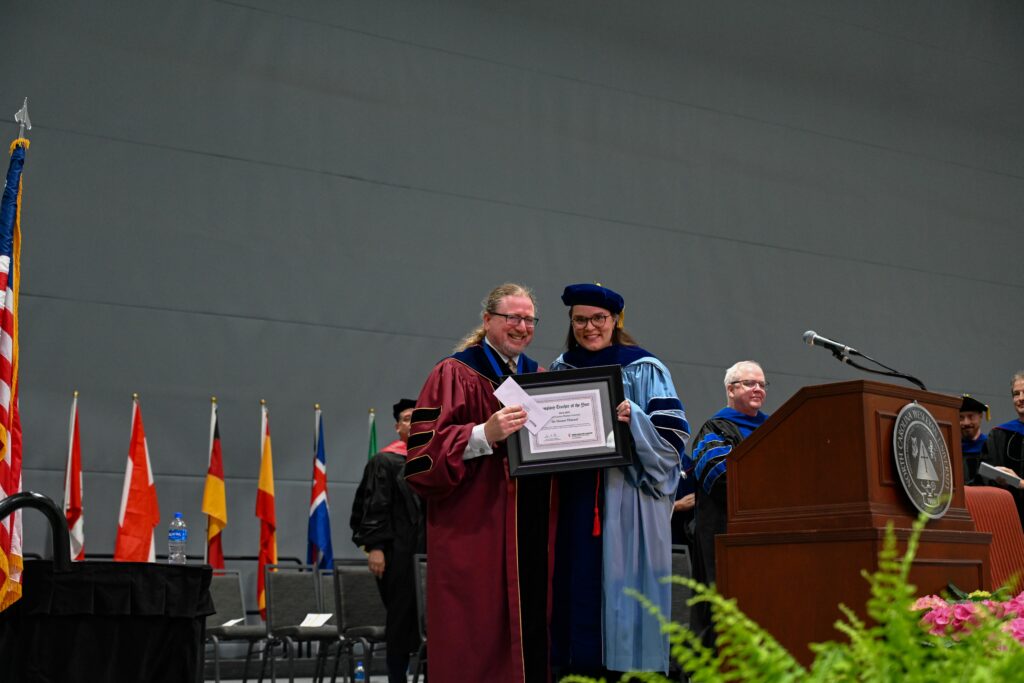
After Velicki’s inspiring speech, Dr. Lane, Provost and Sr. Vice President of Academic Affairs, presented the Exemplary Teacher Award to Dr. Doreen Thierauf, Associate Professor of English. This award recognizes excellence in teaching and promotion of student learning, civility and concern for students and colleagues, commitment to value-centered education, service to students beyond the classroom and service to the larger community beyond campus. During her eight years on our faculty, she has published more than two dozen articles, edited volume chapters, and reviews, and she averages more than four publications and more than four newly presented talks or papers each and every year. She creates a dynamic and energized space in which students are invited to share their own thoughts and feelings on some of the most challenging concepts you can possibly discuss, and in spite of, or perhaps because of, the heavy subjects that she asks to students to reflect on her students routinely rise to the occasion.
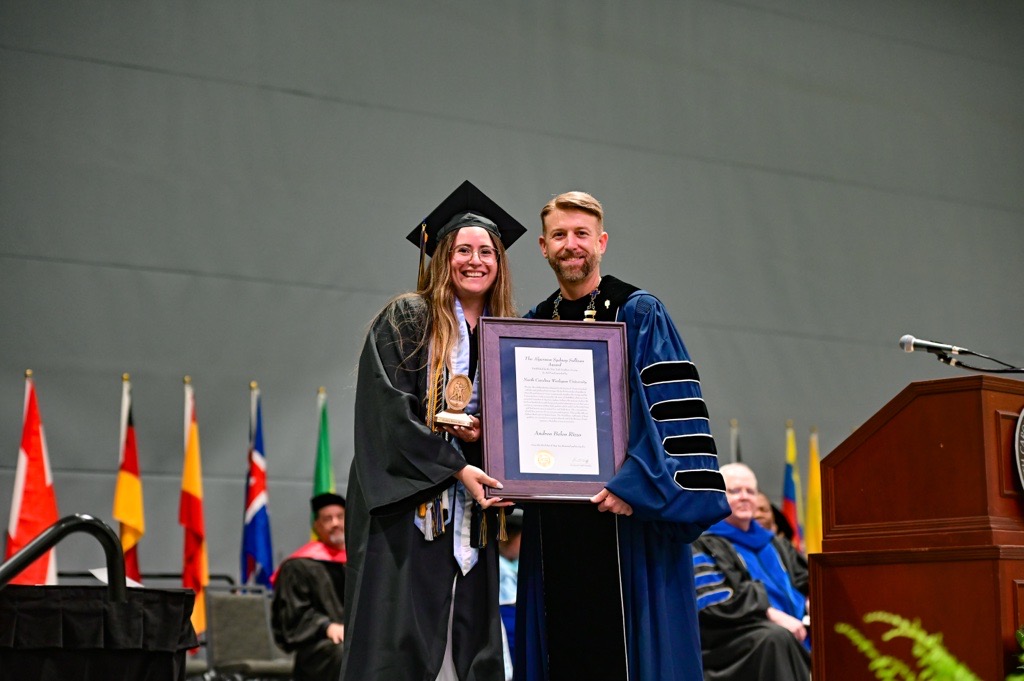
Andrea Belen Rizzo received the Algernon Sydney Sullivan Award, which honors a senior who best exemplifies excellence in character, leadership, service to the community and a commitment to spiritual values. This humanitarian award is meant to recognize those who have selflessly given to others or served others in some way. The recipient is chosen by the Honors Awards Committee.
Ms. Rizzo is a Biology and Environmental Science graduate from Argentina who has distinguished herself on the Wesleyan campus and in the community by her leadership of the Worldwide Welcome Team for international students at North Carolina Wesleyan and is a member of S.E.A.T., Science Club, NSLS, Phi Beta Sigma Honor Society, President of IBA, id on the President’s Honors List, and both Homecoming Princess and Queen. She will be continuing her education at Texas A&M as she was recently accepted into their Ph.D. Marine Biology program.
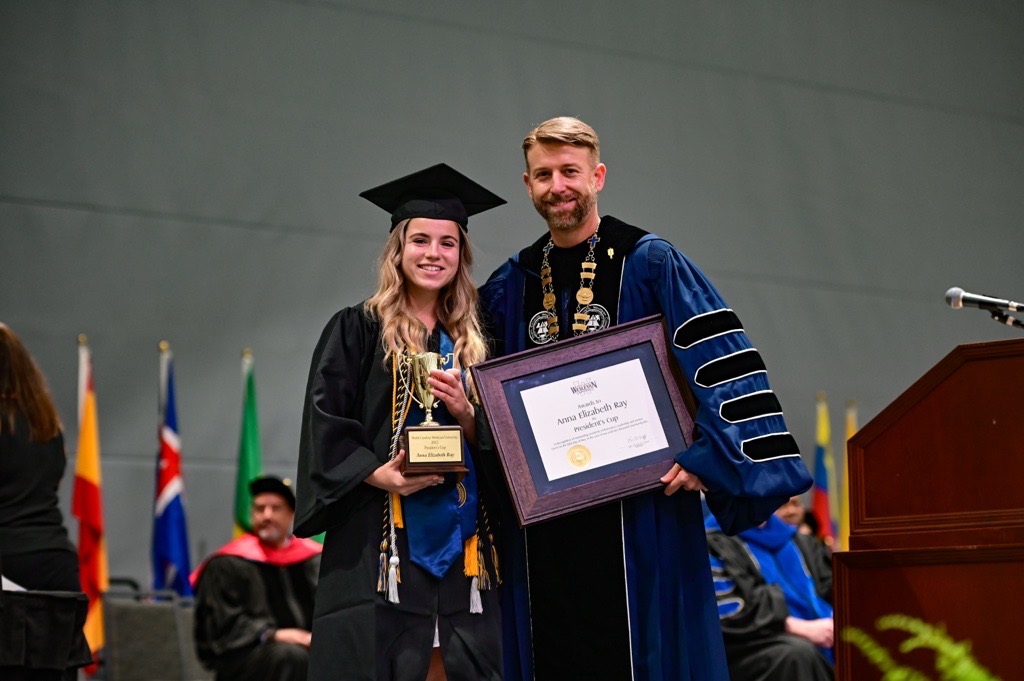
The President’s Cup Award was presented to Anna Elizabeth Ray, a senior who best exhibits those characteristics considered most desirable in a graduate. Of particular importance is the attainment of the highest standards of academic performance as demonstrated by the overall grade point average at North Carolina Wesleyan University. The recipient is also chosen by the Honors Awards Committee.
Ms. Ray is from Richlands, North Carolina. She graduated with a major in Psychology, and was a member of the Cross-Country Team. She became an active student leader, serving as a member of S.E.A.T. and a Resident Advisor. Graduating with honors, she plans to pursue a master’s degree in Human Resource Management.
Upon the recommendation of the Honorary Degree Committee and the approval of the Board of Trustees, Mr. Danijel Velicki was honored with the degree of Doctor of Humanities Honorary Degree from NC Wesleyan University.
Clemmons Family Honored
This commencement ceremony was especially moving as Wesleyan honored Matthew Clemmons, who passed away September of 2021, with a Posthumous Bachelor of Arts Degree in Psychology. Matthew was a student-athlete and part of the NCWU football team. He was on the Dean’s List and was soon to be inducted into the Student Leadership Society. Twelve of his family members, friends, and former coach were in attendance to receive the degree in his memory.
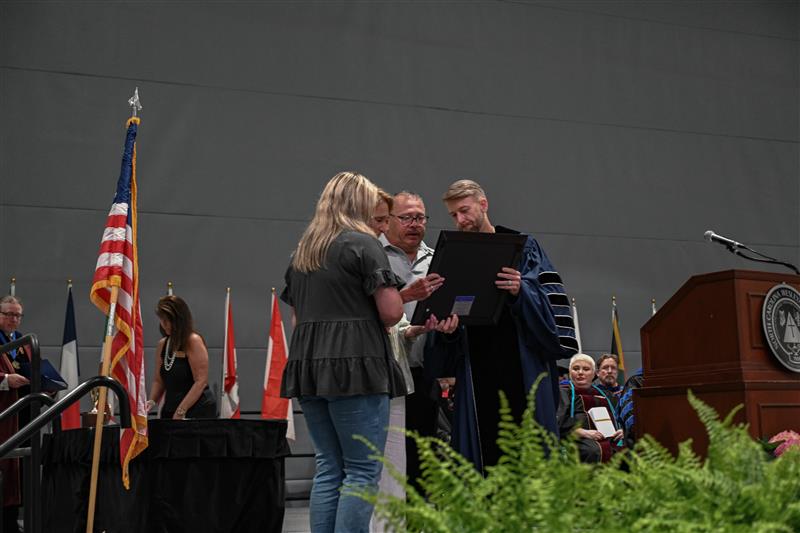
The event was live streamed and recorded so family and friends who were not able to attend in person could celebrate with their students virtually. The recording can be viewed at ncwu.edu and the University’s Facebook page.
Photos can be viewed at gradphotos.ncwc.edu/.
NCWU Welcomes Transfers
With the recent and difficult announcements of the impending closures of Saint Andrews University and Limestone University, North Carolina Wesleyan University is stepping forward to offer a new home and a supportive community for affected students. Understanding the whirlwind of emotions — uncertainty, frustration, and concern about the future — Wesleyan is committed to providing not just a pathway to continue their education but a family to stand beside them every step of the way.
“We recognize that many students are facing unexpected transitions, and we want them to know they are not alone,” said Dr. Evan Duff, President of NC Wesleyan. “Our goal is to offer a safe place, clear guidance, and a community that cheers them on to the finish line.”
To ease the transfer process, NC Wesleyan is waiving application and deposit fees and offering competitive financial aid packages. The University provides robust opportunities, including athletic programs, military and veteran support, international student services, and flexible adult studies. Students can also choose from top academic programs such as Business Administration, Education, Science, Exercise Science, and Criminal Justice.
Additionally, Wesleyan offers housing options and one-on-one advising to ensure a seamless transition. Named one of the safest and most affordable universities in North Carolina, NC Wesleyan delivers a personal, practical, and purpose-driven educational experience.
“Your academic journey isn’t over,” added Dr. Duff. “It’s simply finding a new chapter — and we are ready to help you finish strong, as part of our Bishop family.”
Learn more about these special transfer opportunities for SAU and LU students.
NCWU Recognizes Outstanding Employees at 2025 Awards Ceremony
North Carolina Wesleyan University recently held its 2025 Annual Employee Awards and Recognition Ceremony on Wednesday, April 23, 2025. The University’s Employee Awards ceremony provides recognition to coaches, faculty and staff for their years of service to the University and for exemplary service to the campus and community. Pictures from this event can be found at https://photos.ncwc.edu/Faculty-and-Staff-Awards-2025.
Wesleyan Service Awards
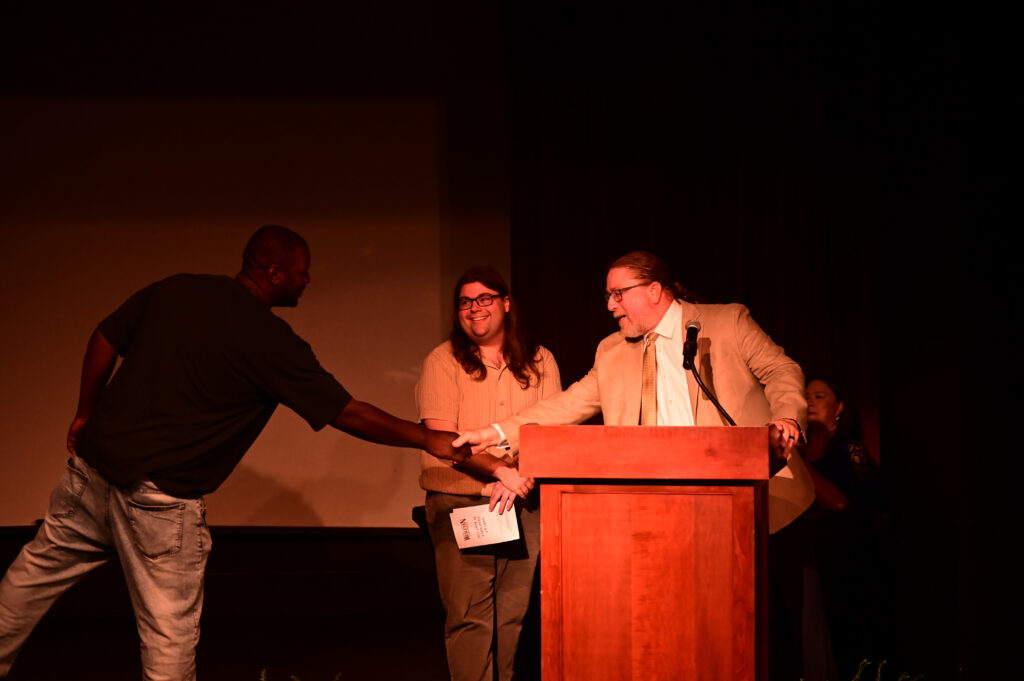
Recipients of the Wesleyan Service Award were Hunter Pulliam and Darnell Lawrence. These employees demonstrated outstanding service to the campus and/or community that was above and beyond their job responsibilities.
Hunter assisted in a Ward 7 “Fun Day” on campus. His nominee communicated his passion and service to the community and making the event a special day for all involved. He was recognized for being a team player who assisted with transporting, handing out materials, and going above and beyond.
Darnell was recognized for going above and beyond supervising custodians, but also helping with maintenance and grounds crew. He is often found on campus outside of his working hours ensuring that campus is in the best condition it can be in for campus guests and visitors to experience.
Jefferson-Pilot Professorship Award
This year’s Jefferson-Pilot Professorship Award winner was Dr. Gail Marsal who presented her Lecture on April 10th. Regarded as one of the highest honors and form of recognition a faculty member may receive, this award is designed for the faculty members scholarly contributions to their students, the campus, and their professional field of study. Nominations are made by Faculty Council and a grant is made available to the recipient for professional development.
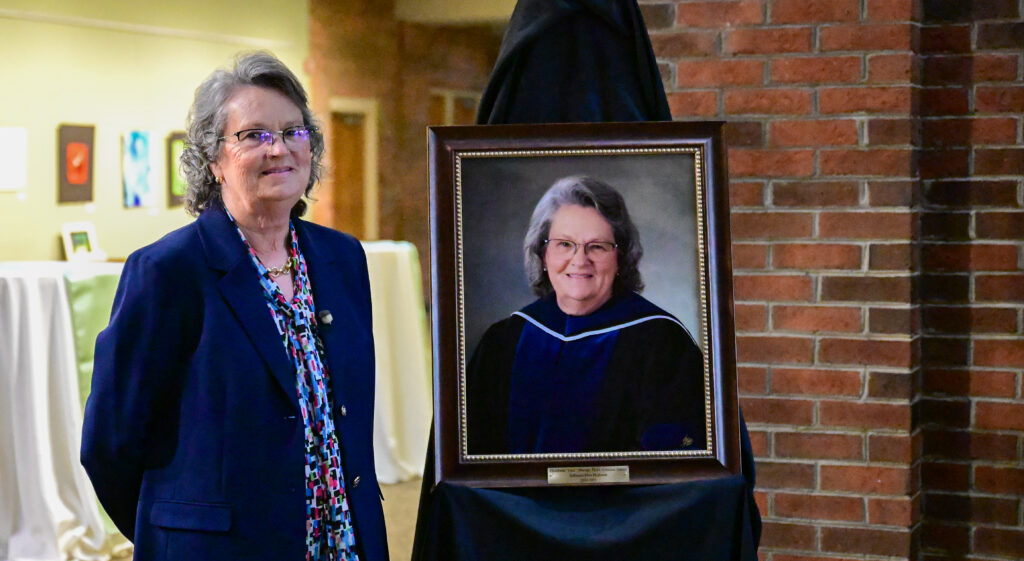
Distinguished Staff Award
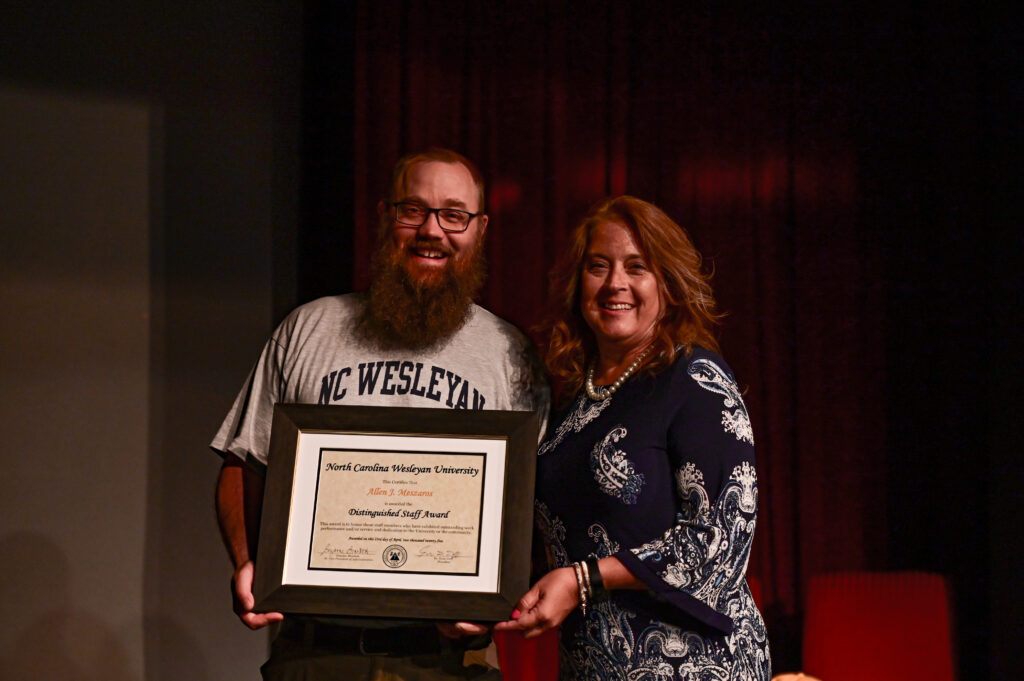
The Distinguished Staff Award was presented to Allen Meszaros, Network Administrator. This award is designed to honor those staff members who have exhibited outstanding work performance and/or service and dedication to the University or the community. Examples include, but are not limited to, outstanding program development, positive attitude in relationships with faculty, staff and students, noteworthy achievement or exemplary leadership on the campus or in the community.
Leah Hill and Dr. Daniel Elias were both presented with the Inspirational Award honoring employees who exemplify a positive attitude and demeanor that is inspirational to students, faculty, staff, and the greater campus community. These people make an extraordinary effort to support others whose efforts improve morale and positively impacts students, faculty, and staff as well as demonstrate the University’s core values.
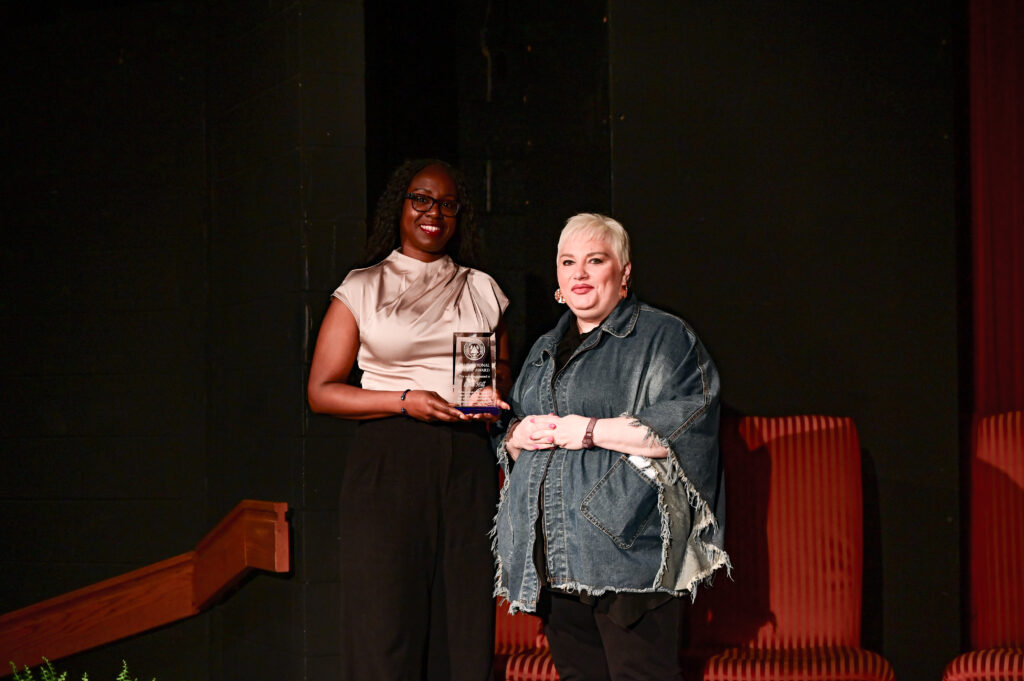
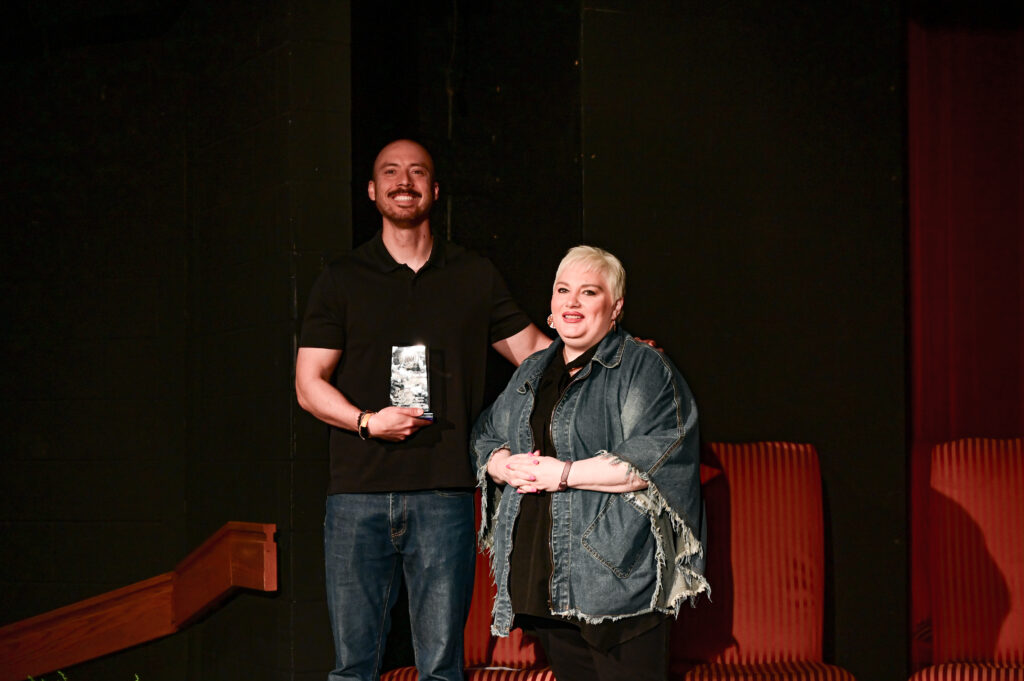
Chuck Taylor Leadership Award
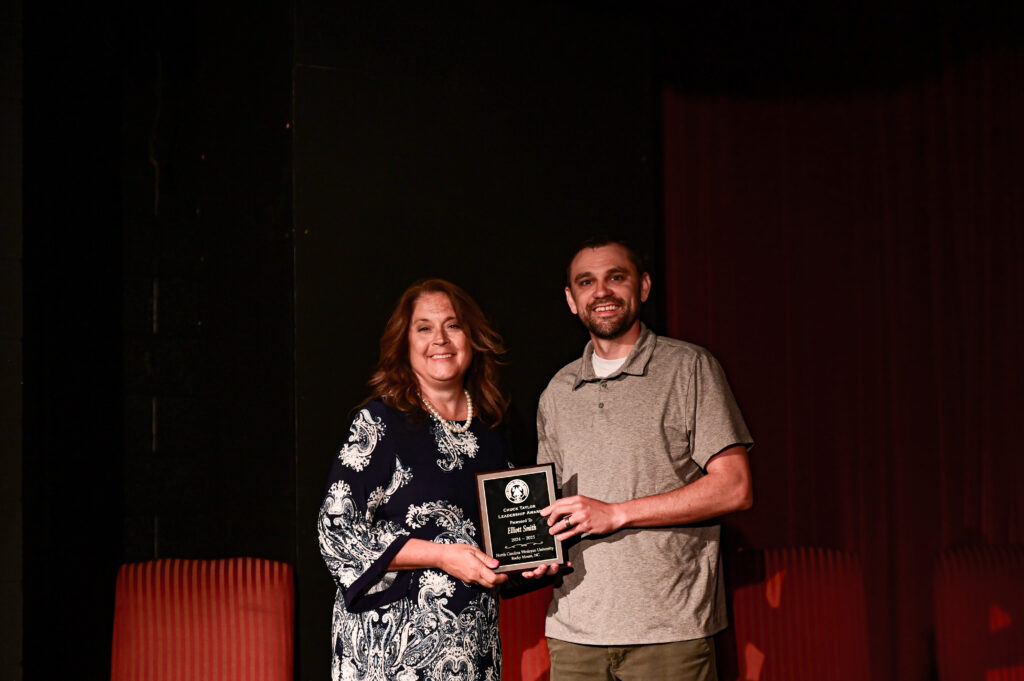
The Chuck Taylor Leadership Award was given to Elliott Smith, Director of Student Engagement. This award is presented to employees who demonstrate and live the following: Principles of servant leadership; Building community by promoting a work environment that is respectful, collegial and supportive; Orienting goals and achievements in line with the University’s mission; Exhibiting strong stewardship of institutional resources (time, talent, financial); Developing a shared vision of institutional excellence; fosters an atmosphere of collaboration and creativity, which contributes to the efficiency and effectiveness of productivity. This individual is also an effective leader of people.
Longevity Awards were also given to various full-time and part-time employees for their years of service. Recognition was awarded in 5-year, 10-year, 15-year, etc. increments of service to the University for the contractual or fiscal year.
Congratulations to all employees who were honored and we thank each employee for your dedication and commitment to NC Wesleyan University! For more information regarding Faculty and Staff Awards or to nominate an employee, visit https://ncwu.edu/faculty-staff-resources/facult’y-staff-service-awards/.





